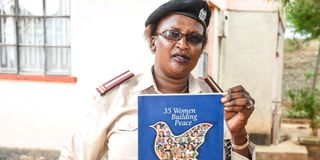Kenya on track in implementing UNSCR 1325

Kainuk location chief Ms Sarah Lochodo displays a book titled 35 Women Building Peace in which she is featured, during an interview at her home in Turkana County, on October 30, 2020. File| Nation Media Group
What you need to know:
- The 1325 Resolution calls on countries to be deliberate in involving women in peace and security processes.
- Kenya has been lauded for making steady progress in implementing the UNSCR 1325.
- However, structural inequalities, cultural and religious factors are identified as emerging issues hindering full realisation of the UN Resolution in Kenya.
Kenya has made steady progress in increasing women’s participation in peace and security processes.
Ministry of Public Service and Gender Cabinet Secretary Prof Margaret Kobia identified increase of women in county peace committees and justice sector as milestones achieved in implementing United Nations Security Council Resolution 1325 (UNSCR 1325) on women, peace and security, adopted in 2000.
“The government spearheaded development and implementation of the first Kenya National Action Plan 2016-2018 on implementation of the resolution and we have recorded an increase of women in county peace committee by 27 per cent,” she said in October during a High Level Virtual meeting to mark 20th anniversary on UNSCR 1325.
The meeting was jointly organised by her ministry and UN Women.
In 2018, women constituted 28 per cent of the Supreme Court judges, 32 per cent of judges in the Courts of Appeal and 42 per cent of judges in the High Court, according to data provided by Prof Kobia.
She added that overall, the Judiciary has attained near gender parity, with women comprising 48.4 per cent of the workforce.
Inclusion of women
On May 27, Ministries of Public Service and Gender and Interior and National Coordination launched the 2nd Kenya National Action Plan (2020-2024) to advance the successes of the lapsed 2016-2018 action plans.
The 1325 Resolution calls on countries to be deliberate in involving women in peace and security processes namely negotiations and reconciliations.
The new action plan enshrines government’s commitment to inclusion of women in strategising measures to address gender-based violence (GBV), climate change,human trafficking and forced migration and humanitarian disasters such as droughts,fires, floods, terrorism and diseases.
“The distances women and girls walk to get basic needs to sustain their families puts them at risk of sexual violence, and then increases their vulnerability to conflict when there are cycles of revenge attacks,” reads in part, the section on climate change.
Structural inequalities, devolution and cultural and religious factors are identified as emerging issues that the government ministries, departments and agencies will also be committed to address under the action plan.
“Structural inequalities continue to weaken women’s capacity to strengthen their economic base, leading to high levels of poverty among women that consequently limit their capacity to participate effectively in decision making at community, county, and national levels,” reads in part, a section on the action plan.
Commendable efforts
“Successful implementation of our 2nd National Action Plan 2020-2024, will definitely contribute towards the achievement of this noble goal (of putting women at the core of peace and security agenda),” she said during the October meeting.
She said Kenya could capitalise on its non-permanent member position at the UN Security Council to promote the sustainable inclusion of women in the peace and security agenda across the world.
UN Women Country director Ms Anna Mutavati said investing in community-based networks of women, including young women would strengthen women’s role in conflict prevention and resolution, peacekeeping and peace-building.
“More investment must be made in supporting the role of women’s movements in strengthening justice and peace,” she said.
She added that Kenya, having led in 2018 global ranking of female participation in UN peacekeeping missions with a 19 per cent representation, exemplifies its commendable efforts in implementing the resolution.
She however noted the need for reinforced efforts to address inequality which results to social unrest and conflict.
“Peace and security for all can only be achieved and sustained if there is peace and security for women and girls," she said.
And this, added Ms Mutavati, can be achieved if women and girls have equal socio-economic and leadership opportunities, enjoy access to resources and services and are protected from gender-based violence.





